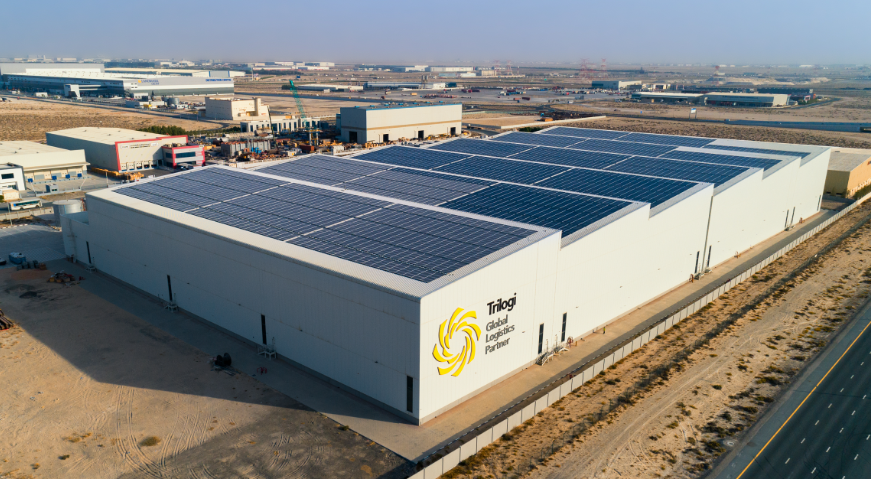Amana Solar, a UAE-based sustainable energy provider for businesses, has successfully implemented a 3,515 kWp rooftop solar installation at Trilogi’s Mega Distribution Center (DC) warehouse in Jebel Ali Freezone, which enables the growing logistics business to swiftly switch to clean energy while significantly reducing its energy costs by around AED2.45 million in the first year of operation.
Today Trilogi is a rapidly-expanding logistics arm of Gulf Marketing Group (GMG), operating across the UAE and GCC region and offering air, sea, and land freight solutions. The latest solar installation will offset more than 80% of Trilogi’s power consumption at the warehouse, lower their operating costs, and reduce carbon emission by around 70,000 tons during its lifetime, which is equivalent to removing 15,000 vehicles off the road and consuming 159,000 barrels of oil.
While the construction of the 68,000 sqm Trilogi facility—consisting of six interconnected angled roofs—was underway, Trilogi and Amana Solar saw an opportunity to take the warehouse into a more sustainable future with an ideal landscape for hosting a solar power system. Amana Solar completed the project within three months following the construction of Trilogi’s warehouse.
Riad Bsaibes, President & CEO of Amana Investments, said: “Our relationship with Trilogi over the years has been one that we are especially proud of, resulting in the construction of several of their facilities. We thank Trilogi for their trust in AMANA and we look forward to continuously supporting and enabling their sustainability goals.”
Mohammad A. Baker, CEO of GMG, said: “Today Trilogi is a growth business, and as part of that expansion, we feel it is important to develop in a sustainable way that will provide long-term value to our business, our customers, and the communities in which we operate. Working with partners like Amana Solar not only enables us to leverage the very latest technologies and systems, but contribute to the UAE’s own renewable energy ecosystem.”
The rooftop solar plant is expected to generate around 5.5 GWh during its first year of operation by utilizing high-efficient Mono PERC modules and German string inverters which decentralizes the clean energy production and minimizes downtime losses.

